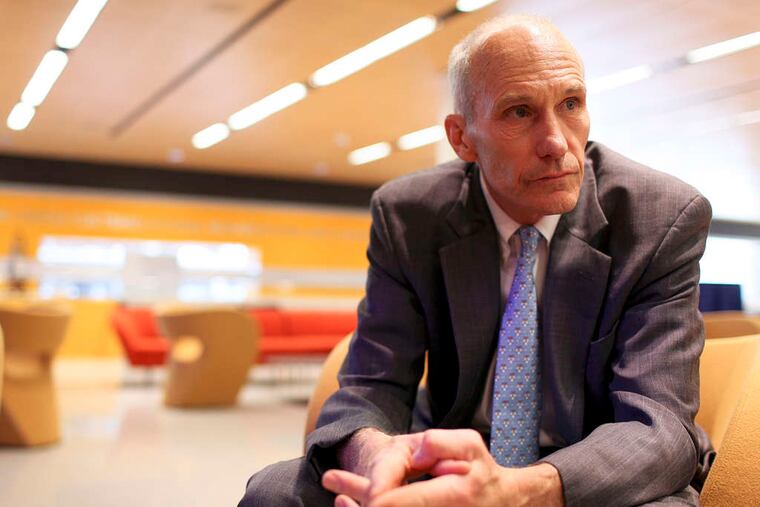Penn tops USA in CAR T-cell patents; Robo-juice at Sofresco plant, Malvern; $25M to HealthVerity; Sumo Digital back in Philly; Carlyle’s CGFI buys Pine Hill
Penn and its scientists have filed for 428 patents for 54 separate CAR T-cell inventions, according to Nature Biotechnology.

Around Philly, a new factory, new cash, a new home, new owners, and lots of patents.
Penn leads in gene patents
The University of Pennsylvania leads the race to patent cancer-fighting CAR T-cell research in an attempt to extract profits from commercial therapies based on doctors’ research, according to an article by Bjorn Jurgens and Nigel S. Clarke in the science journal Nature Biotechnology.
Penn and its scientists have filed for 428 patents for 54 separate CAR T-cell inventions, according to the article. University College, London, has 117 patents for 14 inventions; the National Cancer Institute, 98 patents for 14 inventions; and Memorial Sloan Kettering Cancer Center, 80 patents and 11 inventions.
“The most productive [single researcher ranked by patents] was U.S. researcher Carl June of the University of Pennsylvania,” with 315 patents (almost three-quarters of Penn’s total) for 31 inventions.
Among corporations, Novartis, the Swiss drug-maker that has worked closely with Penn, had the largest number of patent applications, followed closely by Clellectis (France) and then by Suzhou Puluoda Biological Science & Technology of China. Worldwide, China trailed the United States but was ahead of Western Europe in T-cell patent applications.
Will that translate into fat payouts for Penn? “Although CAR T-cell immunotherapy may be about to enter the mainstream and has already been the subject of legal scrutiny," the technique remains "an emerging technology,” Nature Biotechnology noted.
Robo-juice by Sofresco
A European juice company plans to open a highly automated 17,000 square foot plant at Universal Pure’s cold-storage and cold-processing complex, 7 Lee Blvd. in the Great Valley corporate center north of Malvern to bottle juices at temperatures just below freezing, a process the companies say avoids taste-damaging heating. So sealed containers can sit on store shelves for two months or longer without added preservatives, sugar or water. Plant capacity is two million gallons a year.
The company, Sofresco, the U.S. arm of Portugal-based multinational juice maker Sonatural — itself an arm of Grupo GL, SA — recently won a Walmart supply contract. Besides shipping juice to U.S. stores starting this week, the plant will export to Mexico and parts of Central America, starting in May, Sofresco co-owner Doug Gilman said in a statement.
High-pressure processing is a cheap way to make juice safe from bacteria and “impurities” over a long shelf life, Universal Pure chief executive Mark Duffy said in a statement. The company says it will buy apples and other fruit from farms in Pennsylvania and nearby states. South-central Pennsylvania, South Jersey and the northern Delmarva Peninsula are home to commercial orchards.
The company plans to hire up to 20 local workers for what it called “highly skilled management and factory jobs.”
Plans call for bottling juices that include tropical and vegetable flavors — avocado, banana, beet, ginger, lemon, mango — mixed with common apple juice. Sofresco says it avoids genetically-modified fruit and BPA plastics. The price is higher than cheap convenience-store juice; the company suggests around $4 for a 12-ounce bottle. It also offers “wellness shots” including “Purifying Charcoal; Turmeric & Cayenne; and Ginger,” around $3 for a shot-glass-sized 3.7 ounce serving. Both products contain around 70 calories, the company said.
Universal Pure, LLC, a division of Chicago-based Tilia Holdings, is based in Villa Rica, Ga., where it has a cold-storage and cold-processing plant similar to the one in Malvern, where it employs around 40. It also has cold-storage and cold-processing plants in Lincoln, Neb. and Coppell, Tex.|
$25M for HealthVerity
Health-care consumer data manager HealthVerity Inc., of Center City has raised $25 million in third-round (Series C) funding from investors led by San Francisco- and New York-based Foresite Capital and including Flare Capital, Greycroft Partners, and other previous investors who “support our long-term executives,” said Andrew Kress, HealthVerity’s CEO and cofounder.
HealthVerity will use the money to develop products including HealthVerity Census (aggregating customer data), Marketplace (finding and licensing consumer information), and HealthVerity Consent (“a blockchain-driven platform for managing patient and consumer permissions”).
The company says its clients include more than 100 large drug makers, drug distributors, insurers, and hospitals. Foresite managing director Jim Tananbaum will join the HealthVerity board. Philadelphia law firm Blank Rome LLP advised HealthVerity in raising the cash. www.healthverity.com.
SUMO Heavy is back
SUMO Heavy Industries, a 16-person (some remote) digital-commerce consulting firm started by Bart Mroz and Bob Brodie in 2010, moved to a coworking space in New York three years later. But its staff has returned to Philly, leasing the firm’s first dedicated office space in the Creative Arts building on Second Street in Old City and the N3RD St. tech district, Mroz reports. “Nothing beats having your own place with your name on the door," with a kitchen, bathroom, and shower, too.
Carlyle’s CFGI buys Pine Hill
CFGI, a Boston technical accounting and financial advisory service owned by buyout giant Carlyle Group, says it has acquired Pine Hill Group, a 70-employee, 13-year-old accounting and deal advisory firm with offices in Philadelphia, Princeton, and New York. The price was not disclosed.